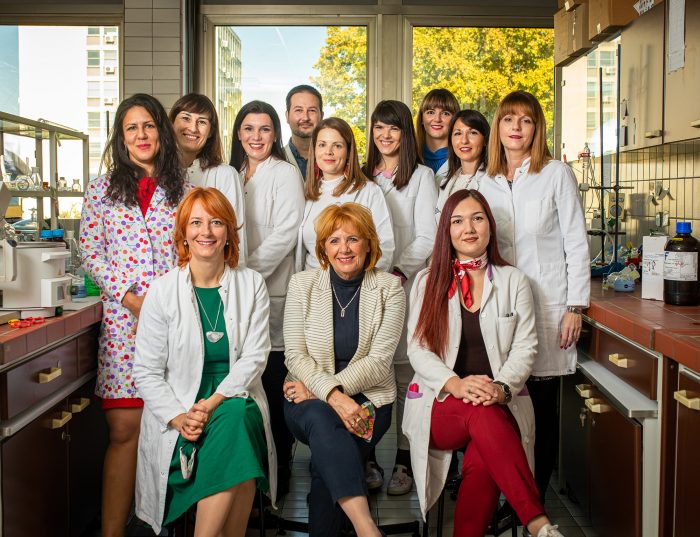
Group members:
- PhD Neda Mimica-Dukić, Full Professor
- PhD Ivana Beara, Full Professor
- PhD Dejan Orčić, Full Professor
- PhD Marija Lesjak, Associate Professor
- PhD Nataša Simin, Associate Professor
- PhD Emilija Svirčev, Assistant Professor
- PhD Sanja Krstić, Senior Research Associate
- PhD Milena Rašeta, Research Associate
- PhD Tatjana Majkić, Teaching Assistant
- Msc Sanja Berežni, Research Assistant
- Msc Kristina Bekvalac, Senior Technician
Contact person:
PhD Neda Mimica-Dukić, Full Professor
neda.mimica-dukic@dh.uns.ac.rs
tel: +381 21 485 2757
On-going projects:
- Biologically active natural products as potential sources of new drugs and dietary supplements, project number
Fundamental Project financed by Ministry of Education, Science and Technological Development of the Republic of Serbia
Project number: OI 172058
Duration: 2011-2019
Project leader: Dr Neda Mimica-Dukić
- Biologically active components and medicinal potential of functional foods grown in Vojvodina, project number
Research project financed by Provincial Secretariat for Science and Technological Development, Autonomous Province of Vojvodina, Serbia
Project number: 114-451-2149/2016-03
Duration: 2016-2019
Project leader: Dr Neda Mimica-Dukić
Research focus
The main research focus of the group is identification, chemical characterization and isolation of natural compounds from plants and assessment of their application in the production of new drugs, dietary supplements and functional foods.
The main directions of the research are:
1) Chemical characterization of plants: a qualitative and quantitative analysis of chemical profile of plant samples is carried out using classical and modern instrumental methods (LC-DAD-MS/MS, GC-MS), with the aim of metabolic profiling and their chemotaxonomic determinations, as well as the selection of plant species for further assessment of their biological activity. The phytochemical studies are primarily related to secondary plant biomolecules, primarily polyphenolic compounds and essential oils.
2) Isolation of secondary plant biomolecules: By chromatographic techniques (flash chromatography, centrifugal partition chromatography – CPC, semi-preparative HPLC), pure components from plant samples are isolated in order to characterize them with spectrometric and other methods (UV/VIS, ESI-MS, EI-MS, 1D and 2D NMR, polarimetry, CD), as well as for further investigation of their biological activity, mechanism of action and structure–activity relationship.
3) Biochemical studies include examination of whole spectrum of biological activities of plant extracts, isolated compounds and essential oils, with particular emphasis on:
- Testing of the antioxidant activity, which is carried out using a large number of standard in vitro tests, as well as effects of plant extracts on the activity of antioxidant enzymes and other biochemical parameters in the blood and liver of experimental animals.
- Testing of anti-inflammatory activity, i.e. the influence of plant extracts and pure compounds on the metabolism of arachidonic acid in monocyte/macrophage cellular systems, where their influence on the expression of the gene and the synthesis of proteins involved in the metabolism of arachidonic acid, as well as the production of various metabolites that play a role in inflammation, are monitored.
- Study of modulation of iron absorption using in vitro and in vivo systems on transcription, post-transcriptional, translational and post-translational levels. These research aims to elucidate the great therapeutic potential of secondary plant molecules for the treatment and prevention of iron metabolism disorders, such as iron deficiency anaemia, which is the most common nutritional disorder affecting more than 30% of the world’s population.
4) Investigation of the influence of different environmental factors on the quality of plant food based on monitoring of various chemical, biochemical and physiological parameters.
The research group is primarily oriented towards finding and introducing new, reliable and efficient methods for chemical profiling of plant samples, as well as new non-invasive methods for determining certain biological activities. In this regard, the use of tandem mass detection (QqQ MS/MS) is particularly emphasized, both in qualitative and quantitative analysis of samples, as well as in biochemical analyses.
Equipment
High-performance liquid chromatograph with DAD detector (Agilent Technologies 1100 Series); High-performance liquid chromatograph Agilent Technologies 1200 Series coupled with DAD detector and 6410 TripleQuad mass detector with electrospray ion source (ESI); Centrifugal partition chromatography system (Waters semi-preparative liquid chromatograph, coupled with Kromaton centrifuge); Purification system for ultra pure water (ELGA Labwater), Thermal Cycler (Applied Biosystems); Quantitative PCR (Agilent Technologies); Multiskan Spectrum microplate reader (Thermo Scientific), Biological Safety Cabinet, Class II (Thermo Scientific), Water-Jacketed CO2 Incubator (Thermo Scientific), Inverted Microscope (Leica Microsystems), Electrophoresis and blotting system (Scie-plas; Apelex; Consort), Ultra-Low Temperature Freezer (Eppendorf); Autoclave (Systec); Refrigerated centrifuges (Sigma), Qubit fluorometer (Invitrogen); Incubator shaker (IKA; Thermo); Microplate Shaker (Edmund Buhler); Shakers (Heidolph; Stuart); Ultrasonic homogenizer (Bandelin); Disperser (IKA); standard laboratory equipment (vacuum evaporator, water and ultrasonic baths, vortexes, pH meters, spectrophotometers, analytical and technical scales, centrifuges, etc.).
Collaborations
Biological Research Center of Hungarian Academy of Sciences, Szeged, Hungary; University of Regensburg, Institute of Pharmacy, Department of Pharmaceutical Biology, Regensburg, Germany; University of Athens, Faculty of Pharmacy, Department of Pharmacognosy and Natural Products Chemistry, Athens, Greece; Technical University of Graz, Faculty of Technical Chemistry, Chemical & Process Engineering and Biotechnology, Graz, Austria; University College London, Research Department of Structural and Molecular Biology, Division of Biosciences, London, UK; Prince of Songkla University, Faculty of Sciences, Hat Yai, Thailand; Department of Biosciences, Åbo Akademi University, Turku, Finland; Natural Chemistry Research Group, University of Turku, Finland; Department of Pharmacy, Health and Nutritional Sciences, University of Calabria, Italy; Department of Physiology and Pharmacology “Vittorio Erspamer”, Sapienza University, Rim, Italy; Faculty of Biology, University of Belgrade, Serbia; Faculty of Medicine, University of Novi Sad, Serbia; Institute for the Study of Medicinal Herbs “Dr Josip Pančić” from Belgrade, Serbia.
Other
Selected group references:
- Orčić et al (2014): Quantitative determination of plant phenolics in Urtica dioica extracts by high-performance liquid chromatography coupled with tandem mass spectrometric detection. Food Chemistry, 143: 48-53.
- Lesjak et al (2018): Antioxidant and anti-inflammatory activities of quercetin and its derivatives. Journal of Functional Foods. 40: 68–75.
- Beara et al (2017): Polyphenolic profile, antioxidant and neuroprotective potency of grape juices and wines from Fruška Gora region (Serbia). Intenational Jounal of Food Properties. 20: S2552-S2568.
- Lesjak et al (2016): Binary and tertiary mixtures of Satureja hortensis and Origanum vulgare essential oils as potent antimicrobial agents against Helicobacter pylori. Phytotherapy Research. 30: 476-484.
- Mimica-Dukić et al (2010): Essential Oil of Myrtus communis L. as a Potential Antioxidant and Antimutagenic Agents. Molecules. 15: 2759–2770.
- The members of the group have been invited to hold plenary lectures at international and national congresses
- An international project of special importance for the research group is the Cross-border cooperation in development of a novel herbal drug targeting Helicobacter pylori (HELICO) – HUSRB/1203/214/230
- Members of the group are in editorial boards of international journals Molecules and Phytotherapy Research, as well as active reviewers in international journals Food Chemistry, Industrial Crops and Products, Journal of Agricultural and Food Chemistry, Molecules, Journal of Herbal Medicine, Clinical Phytoscience, Separation Science Plus, Food Research International, Chemosphere
- Within the research group, close to 20 doctoral dissertations have been defended, and hundreds of master and bachelor theses
- The research group has formed a laboratory LAFIB that provides services to scientific institutions and private companies in the field of its research: http://www.dh.uns.ac.rs/lafib/
- The members of the group have been awarded by multiple awards in the country and abroad. Some of the prizes are: Lifetime Achievement Award for University Teachers and Scientists of Vojvodina, Serbia; L’Oréal-UNESCO For Women in Science National Fellowship; “Start Up for Science” Scholarship, Serbia; “Dr Zoran Đinđić“ Award for the best young scientists and researchers from Vojvodina region, Serbia; Award for the most citied young researcher in Vojvodina region, Serbia; Special Award “Dr Zoran Djindjic” for young scientists and researchers for the overall contribution to science, Serbia; Dr. Willmar Schwabe scholarship for young scientists, international.

